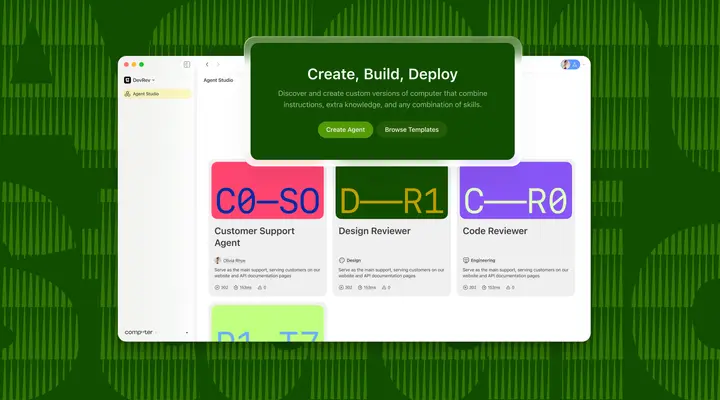At DevRev, we believe that design is the key to making AI not only powerful but also human-centered and intuitive. To dive deeper into this philosophy, Dheeraj Pandey, CEO of DevRev, sat down with Georg Petschnigg, our newest board member and design expert, to explore how design will influence the future of AI, product development, and customer experience at DevRev.
In this candid conversation, Georg shares his insights on how design transforms AI into a tool that empowers both users and organizations, making AI-driven products more seamless, adaptable, and enjoyable.
Dheeraj: How do you define design within AI?
Georg: Product design gives form to a service so that it can be packaged and consistently delivered. People often think of design as aesthetics and how things look, but it’s more than that. It’s a strategic function that helps a company determine how their offering will be experienced—making it concrete, usable, desirable, and purchasable.
AI as a technology is immensely powerful, but without the right user experience and a foundation of accurate data and knowledge, it can become unruly. With effective design, AI-enabled tools become reliable and steerable. This is a frontier in user interfaces, and on the other side, we will find products that are more seamless, tailored, and enjoyable for consumers, as well as more readily adopted by companies.
The role of design is to ensure that the end user remains in control and can steer the outputs. At the end of the day, AI is for humans.
Dheeraj: What is the role of a design-focused board member?
Georg: The appointment of a design-focused board member signals that DevRev is forward-looking. I believe we will see more design-focused board members in other companies as well. The best boards consider the interests of the entire company—its mission, values, employees, and the markets it serves. Design works laterally; it is the integration point for all functions and disciplines, providing a humanistic grounding for the board.
Every company today must engage in some form of digital product development. DevRev understands this and aims to ensure its tools fundamentally empower and serve everyone in the organization. AI can help people recognize patterns and make connections that once seemed impossible. It’s about putting the person at the center and helping them see the bigger picture.
Dheeraj: How can design play a role in the evolution of DevRev’s product and customer experience?
Georg: Design is the difference between a product people want to use and one they have to use. This isn’t just beneficial for business; in the context of enterprise, tools that people want to use are empowering and adaptable to a variety of new creative use cases. In contrast, businesses focused solely on efficiency gains and replacements will require rigid workflows.
DevRev stands at the center of critical tooling for digital product development, including customer support, analytics, planning, and workflows. It connects these functions with a shared knowledge graph and an AI-enabled data core. Design is what unifies all the pieces of the user experience and delivers that experience in a humanistic way.
DevRev provides an interface that adds value to the knowledge graph. DevRev's Computer illuminates connections between teams that were previously invisible. However, that interface must be designed to ensure these connections are straightforward and accurate. This design enables a DevRev user to discover a new connection through search, act on it, and translate that into a workflow, ultimately resulting in action.
Our goal is to instill organizational change through DevRev. People will work differently as they uncover better ways to collaborate. Suddenly, customer support teams and product managers can work more closely together because, despite their different perspectives, they are viewing the same data set within a unified interface. This is just the beginning of a significant transformation, and it all needs to be designed.
Dheeraj: What have you learned from your career in design that you will bring to DevRev?
Georg: At The New York Times, our mission is to help people understand the world. This means taking a vast array of reporting, data, and events on complex topics like climate, business, and politics and presenting them with clarity. We were successful because we didn’t shy away from complexity; instead, we found the right expressions and formats that lead to better understanding. I believe DevRev faces a similar challenge: compiling a large volume of data and inputs and demonstrating their interconnectedness. I’m excited to help them embrace this complexity and ultimately bring forward the clarity.
Dheeraj: What are the common design mistakes that companies make?
Georg: Companies often don’t realize how much their worldview is shaped by the type of data they seek. This directly limits the design solutions they consider. Often, they pursue simplistic data and engagement signals simply because that’s what’s readily available. In the realm of social media, for example, "time in feed" was easy to measure and often prioritized over design solutions that foster genuine human connection and understanding. Similar parallels can be drawn with productivity tools.
Don’t fall into the trap of busy work that’s easy to measure instead of celebrating your customers and the impact you can deliver for them.
Dheeraj: Why are you excited to work with the DevRev team?
Georg: I’ve been a CEO responsible for customer support, running sales teams, product development, and analytics. It’s challenging, but nothing is more rewarding than the magic these teams can unlock together. I spent many years in the enterprise environment at Microsoft, where I witnessed the early generations of information processors, including the original Microsoft Office Suite. When Office transitioned to the cloud, documents became workflows, unlocking tremendous value for customers. This next chapter of information processing, rooted in AI and LLMs, will truly break us out of the silos of spending all day in spreadsheets and documents.
I understand firsthand how critical a solution DevRev is. I’m excited about what this team is building because it reflects a modern company stack. It makes it easy for marketing, sales, product development, and support to work together – because they have to. At the end of the day they are all working for the same customer.
As Georg Petschnigg points out:
The future of AI isn't just about its raw power—it's about crafting experiences that keep humans in control. ”
At DevRev, we’re not just building AI tools; we’re shaping the future of how teams work together, solve problems, and drive innovation.
With Georg’s design expertise on board, we’re set to break new ground in delivering AI-driven solutions that people love to use, not just have to use. As AI advances, the need for human-centric design will be the game-changer—and we’re ready to lead that revolution.
Stay tuned—this is just the beginning of what’s next at DevRev.





